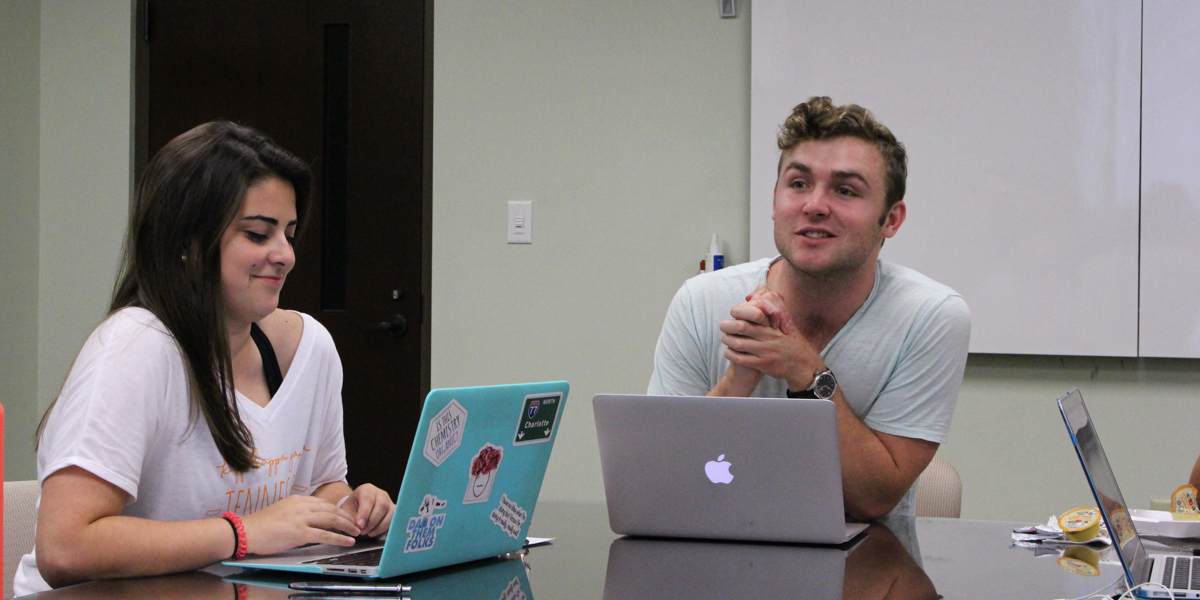By Peter Cates
Upon being admitted to the Chancellor’s Honors Program, I was surrounded by hundreds of students with incredibly varied passions and interests. Many of them challenged my ideas and helped me uncover new doors for intellectual engagement. Since arriving on campus, I knew it was the right community for me. Like many things in life, CHP is very much so about what you put in, and so I have been as involved as possible.
In my first semester at UT, I was elected as a first-year representative of the Honors Council, the Chancellor’s Honors Program’s student representative body. Since then, I have been a sophomore representative and the vice president, and now I serve as president of the Honors Council. My involvement with this body has been an outlet for me, alongside fellow honors students who also care passionately, to serve our community and help voice and meet the needs and interests of CHP students.
HoCo, as we like to call ourselves, is made up of three elected representatives from each cohort as well as an executive board and the chairs of our subcommittees. HoCo’s main objective is to unite students from across cohorts and fields of study in the CHP and thereby create a deeper community of honors students on campus.

The caliber of students in the Chancellor’s Honors Program would be competitive at virtually any university in the world, with admission requirements that mirror the top universities in the country. Therefore, the students elected to the council are some of the best of the best. The thing I love most about HoCo is the relationships I have made with some of the most impressive students at the university. Not only are many of them my best friends, but they have inspired and challenged me to work harder toward my goals and pursue new opportunities. I wouldn’t be so involved with undergraduate research in my department if my fellow councilmembers hadn’t pushed me to do so. Without them, my UT experience wouldn’t be the same.
The biggest challenge for HoCo is unifying more than 1,000 students on our 28,000-person campus. With extensive demands in individual departments on top of the variety of extracurricular activities that CHP students pursue, students often struggle to connect with the rest of their honors cohort once they leave the living-learning community after their first year. When CHP students do not engage with the program, they remain isolated from the diversity of thought and the various activities that we offer. Ultimately, my main motivation is a desire to create a mutually beneficial space that stems from students actively taking part in this smaller stimulating community at UT.

As the student representative body, we are the counterforce to the problem of isolation. In my four years on council, we have provided exciting programming to students in the CHP. We organize an annual upperclass orientation that gathers students to go over CHP requirements, opportunities, and benefits. This program has led to fewer students going on probation or being dismissed for neglected requirements.
Similarly, we run an annual open student forum with council members to increase transparency on the direction of Chancellor’s Honors. This program specifically targets first- and second-year students who are deciding whether or not to continue in the program. Last year, more than 50 students attended, and many of them stayed after the event to ask us how they could be more involved with CHP.
We’ve also started an annual spring formal riverboat cruise that brings CHP students together in a more relaxed social setting. Some of our other programming includes a pancake dinner at the end of each semester, an annual dean’s forum for students to talk with the dean of their college, seminars and lectures by distinguished faculty, trivia nights, and community service days.
 My goal is for my peers and fellow council members to feel empowered to enact positive change in their respective communities. With that, we’re working on some new projects this year as a council. One of our new projects is creating a better system of networking between upper- and underclass persons in terms of advice and mentorship regarding research, careers, courses, service, etc. In an effort to expand our community reach, we are also organizing more off-campus Becker Seminars to places like the Tennessee Arboretum, Oak Ridge National Laboratory, and the Knoxville Museum of Art.
My goal is for my peers and fellow council members to feel empowered to enact positive change in their respective communities. With that, we’re working on some new projects this year as a council. One of our new projects is creating a better system of networking between upper- and underclass persons in terms of advice and mentorship regarding research, careers, courses, service, etc. In an effort to expand our community reach, we are also organizing more off-campus Becker Seminars to places like the Tennessee Arboretum, Oak Ridge National Laboratory, and the Knoxville Museum of Art.
Looking back at my time at UT, CHP’s Honors Council has been my niche here. It’s the place where I feel at home on this massive campus. My classmates, peer and faculty mentors, and program staff have supported and encouraged my desire to make the CHP a better, more inclusive place. Getting to be involved with leadership behind the scenes has not only provided deeper insight into the way a university works but has also given me the privilege of building deeper relationships with the honors staff and with other students.
This home has led to lifelong friendships and what I hope will be a notable long-term impression on our community. As I see everything we’ve accomplished as students and as a program overall, I’m so grateful to have been a part of it.
